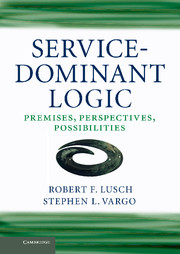Book contents
- Frontmatter
- Dedication
- Contents
- List of Exhibits
- Foreword
- Preface
- Acknowledgments
- Part I Premises
- 1 The service-dominant mindset
- 2 Roots and heritage
- 3 Axioms and foundational premises
- 4 Service as a guiding framework
- Part II Perspectives
- Part III Possibilities
- Appendix Reflection and dialogue
- Index
- References
1 - The service-dominant mindset
Published online by Cambridge University Press: 05 June 2014
- Frontmatter
- Dedication
- Contents
- List of Exhibits
- Foreword
- Preface
- Acknowledgments
- Part I Premises
- 1 The service-dominant mindset
- 2 Roots and heritage
- 3 Axioms and foundational premises
- 4 Service as a guiding framework
- Part II Perspectives
- Part III Possibilities
- Appendix Reflection and dialogue
- Index
- References
Summary
Once destiny was an honest game of cards which followed certain conventions, with a limited number of cards and values. Now the player realizes in amazement that the hand of his future contains cards never seen before and that the rules of the game are modified by each play.
Paul ValéryIntroduction
Part of our nature as humans is to develop belief systems that become handy ways for seeing and understanding the world around us and for ordering our reality. We can refer to these mechanisms as institutional logics. Institutional logics become normative and play a key role in guiding and determining our behavior. Many of these institutional logics arise from our training and education and thus the ordered view of the world from the perspective of an economist is different from that of an accountant, mechanic, sociologist, physicist, fire fighter, or moral philosopher. Regardless, they enable viewing a complex world in what promises to be coherent terms and provide a lens for perceptually separating noise from signal. Thus, they contribute to comfort, understanding, and sense-making.
Just because we are comfortable with our institutional logics does not suggest these logics are always correct or appropriate or do not need to change or evolve. In fact, some institutional logics become so strongly held across individuals that they become paradigmatic and very difficult to shift. It has been found repeatedly throughout history that these paradigms can restrict vision and understanding and scientific advancement. Of course, in business, there are many such “worlds” that need to be understood: cultural, ecological, economic, social, physical, political, technological, and many others. The primary purpose of this book is to contribute to the understanding of the world of economic and social exchange among human actors, both individually and in groups, by proposing an alternative view or perspective, what we call “service-dominant logic” (S-D logic), to the traditional “goods-dominant logic” (G-D logic).
- Type
- Chapter
- Information
- Service-Dominant LogicPremises, Perspectives, Possibilities, pp. 3 - 30Publisher: Cambridge University PressPrint publication year: 2014
References
- 1
- Cited by



